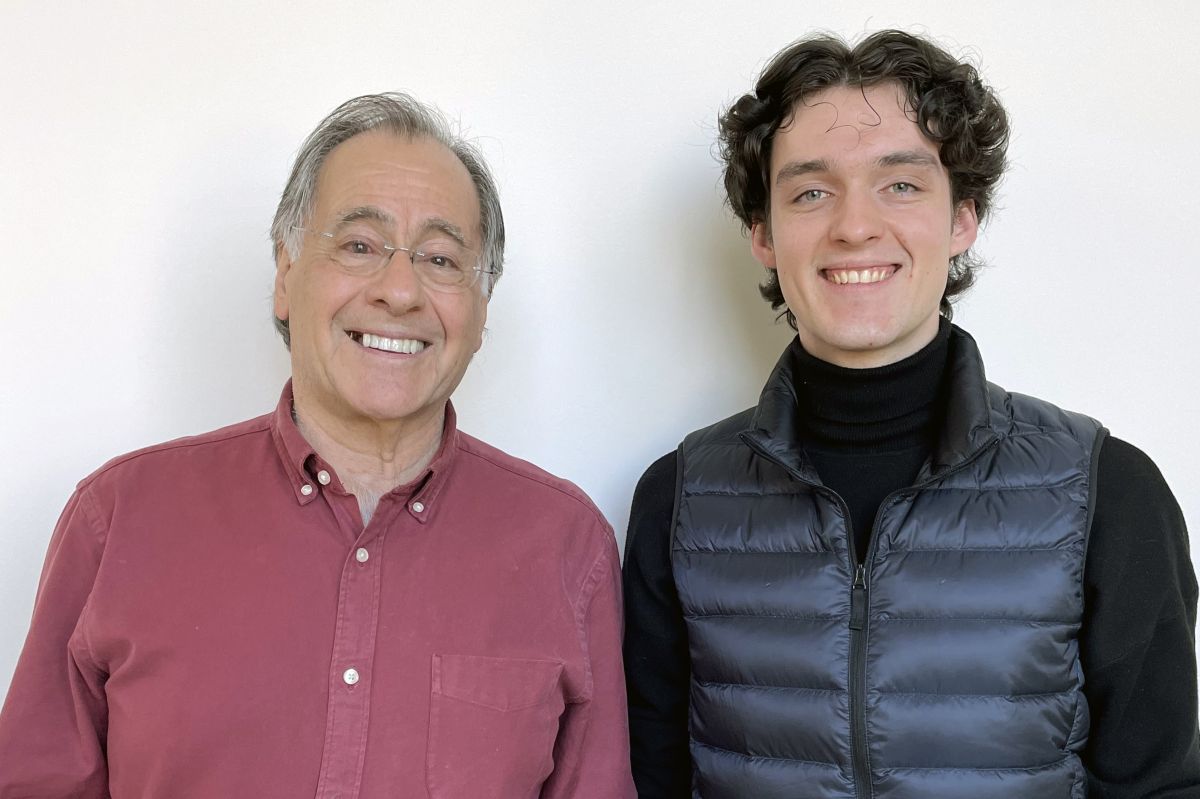Ignas Maknickas: I'm Ignas Maknickas. I'm a pianist and at the moment I'm studying at the Royal Academy of Music in London. I'm doing my Masters of Arts program. And I'm really looking forward to playing with wonderful Bloomington Symphony Orchestra, which, the concert will be on the 5th of March, this Sunday.
Geoffrey Simon: I'm Geoffrey Simon and I have the great privilege of having started and formed the Bloomington Symphony Orchestra all those years ago, in the late 70s, when I was a graduate student here at IU. And the university had, I think, eight orchestras for music students. But I realized there was nothing in Bloomington for people who are not music majors, whether they are community people or people at IU in disciplines other than music. So I put some signs up on trees: “Would you like to play in an orchestra?” On a little green bit of card. Within two weeks we had sixty players, and that was the birth of the Bloomington Symphony Orchestra. And it's been flourishing now. I didn't start it to create a legacy, but it became that, of course, because people populated the Bloomington Symphony. Real, decent people who played because they loved playing. They came together with the common cause: “let's make some music together.” And that's what they needed and were looking for. But then, gradually, as we began to build an audience here in and around Bloomington, we realized that the function of the orchestra was more than just for the players. And, in fact, that's where this legacy began to implant itself. The orchestra has been very fortunate in the past ten years that it's had very good music direction. More recently, with the present music director who's retiring, Alejandro, who's been wonderful for the orchestra. He's a very talented musician and the musicians love working with him. And he has built the orchestra along the lines that community orchestras need now to exist, which is, yes, for the players, of course, but very conscious of the services that an orchestra can provide to its community. Concerts are obvious, but there’s more than that. There are youth programs and educational programs. For instance, Ignas is giving a master class for young pianists in the community—not IU students, but community pianists—as a way of reaching out and giving them an experience where first-rate pianists can impart excitement and insights. Where he will leave a legacy, in my view, is that he has an exceptional lyrical gift as a pianist. He's able to make poetry out of the music, which is why this Rachmaninoff second concerto is so perfect for him to play.
Ignas Maknickas: The second Rachmaninoff concerto is one of the most beautiful pieces ever written, and for me it's one of the most favorite work ever. It was my dream since my childhood to perform this concerto with orchestra and I was really lucky that the conductor on this Sunday will be Maestro Geoffrey Simon, which I really hugely admire. And I'm really looking forward to the concert on Sunday and playing this beautiful piece. There's a huge orchestra and there is a really nice conversation between each of the instruments. You have to know all the parts of the orchestra really well in order to understand the piece and make this conversation happen, which is so important. There are so many beautiful solos of different instruments in the Rachmaninoff concerto, and so many beautiful melodies written in different timbres. There's certain connection, you know, with the piano and those instruments which you have to really make it happen. And it's just wonderful.
Geoffrey Simon: We've talked about the Rachmaninoff, but the program is a very exciting program for the rest of the performance. We start off with Brahms' first serenade—just the first movement—which is kind of like an overture on this program. Then we have the Rachmaninoff. After the intermission, there will be a tribute to Ukraine, where the orchestra's assistant conductor, Isaac Terceros, will be conducting a short piece by a Ukrainian woman composer. Then I'll come back for the most amazing closing piece for this concert, which is the Gances of Galanta by Kodály. It's dance music and it's happy music. But as I was saying to the players, people in Eastern Europe, they find happiness in minor keys, because there's always that background of the suffering that you've come through to get you to today where you can be happy. So that's a great way to end the program. It's very difficult to play but very rewarding.
Aaron Cain: Well, gentlemen, thank you so much for speaking with me today.
Ignas Maknickas: Thank you so much. Thank you.
Geoffrey Simon: Thank you.
Aaron Cain: Pianist Ignas Maknickas and conductor Geoffrey Simon, the founder of the Bloomington Symphony Orchestra and the guest conductor for a concert celebrating the legacy of the orchestra on Sunday, March 5th at 5 PM at the Buskirk-Chumley Theater. Maknickas will be the piano soloist for their performance of Rachmaninoff's Second Piano Concerto. More information at bloomingtonsymphony.com. I'm Aaron Cain for WFIU Arts.







